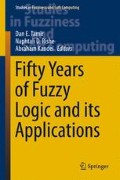Abstract
The theory of fuzziness, offering an important scientific approach in building intelligent machines, has been researched and developed in the past fifty years from various perspectives and applied for real world problem solving in many areas. Daoist thought, being one of the most influential schools of Chinese philosophy, has been studied for more than two thousand years and its wisdom exploited from generation to generation. Would a natural echo exist between the modern fuzzy thinking and the ancient oriental Daoist thought?
Access this chapter
Tax calculation will be finalised at checkout
Purchases are for personal use only
Notes
- 1.
Lotfi A. Zadeh has distributed the same message repeatedly, the quotation here is from his message distributed to BISC online discussion group on Oct 2013.
- 2.
The word Daoism suggests complicated thought system (or Daoist philosophy) and Daoist religious movements. In this essay, the Daoist theories are mainly based on the first Daoist text Daodejing (Tao-te-ching) or the Laozi (Lao-tzu). This has nothing to do with Daoist religious teachings. The quotations from the Laozi are based on Liu’s complication and adaptation from various versions and translations, unless specific citations provided otherwise.
References
Zadeh, L.A.: Toward human level machine intelligence ─ it is achievable? The need for a paradigm shift. IEEE Comput. Intell. Mag. 3(3), 11–22 (2008)
Zadeh, L.A.: Fuzzy logic. In Meyers, R.A.: Encyclopedia of Complexity and Systems Science. Springer (2009) (Entry 769)
Lynn, R.J. tran.: The Classic of the Way and Virtue: A New Translation of the Tao-te Ching of Laozi as Interpreted by Wang Bi. Columbia University Press, New York (1999)
Chan, Wing-tsit.: A Course Book in Chinese Philosophy. Princeton University Press, Princeton (1973)
Lau, D.C.: Tao Te Ching: A, Bilingual edn. The Chinese University Press, Hong Kong (2001)
Zimmermann, H.J.: Fuzzy Sets, Decision Making and Expert Systems. Kluwer Academic Publishers, Netherlands (1987)
Liu, X.: Naturalness (Tzu-jan), the core value in Taoism: its ancient meaning and its significance today. In: Kohn, Livia, LaFarque, Michael (eds.) Lao-tzu and the Tao-te-ching, pp. 210–228. The State University of New York Press, Albany, New York (1998)
Liu, X.: A taoist perspective: appreciating and applying the principle of femininity. In: Raines, J.C., Maguire, D.C. (eds.) What Men Owe to Women: Men’s Voices from World Religions, pp. 239–257. The State University of New York Press, Albany, New York (2001)
Liu, X.: Non-action and the environment today: a conceptual and applied study of Laozi’s Philosophy. In: Girardot, N.J., Miller, J., Liu, X. (eds.) Daoism and Ecology, pp. 315–339. The Center for the Study of World Religions, Harvard Divinity School, Cambridge, MA (2001)
Author information
Authors and Affiliations
Corresponding author
Editor information
Editors and Affiliations
Rights and permissions
Copyright information
© 2015 Springer International Publishing Switzerland
About this chapter
Cite this chapter
Ding, L., Liu, X. (2015). Human and Machine Intelligence — Between Fuzzy Logic and Daoist Thought. In: Tamir, D., Rishe, N., Kandel, A. (eds) Fifty Years of Fuzzy Logic and its Applications. Studies in Fuzziness and Soft Computing, vol 326. Springer, Cham. https://doi.org/10.1007/978-3-319-19683-1_5
Download citation
DOI: https://doi.org/10.1007/978-3-319-19683-1_5
Published:
Publisher Name: Springer, Cham
Print ISBN: 978-3-319-19682-4
Online ISBN: 978-3-319-19683-1
eBook Packages: EngineeringEngineering (R0)

